#osyrian
Text
#i’ll go first#black is better#osyrian#black is beautiful#beauty#black power#black woman#black is king#black love#black lovers#black is the color of my true love’s skin#love poetry#black beauty#art#black art
13 notes
·
View notes
Text
I need to hunt down some sources first to see if certain details appear in native Egyptian sources or if they are exclusive to Greek attestations of the Osyrian mythic cycle but when I'm done would anybody be interested in hearing this whole elaborate thing I have thought out about the family dynamics between Osiris, Isis, Set, Nephthys, Horus, and (most importantly) Anubis as well as what the theological implications may be therein?
#side effects of getting more into practicing kemeticism again:#the side of you who's been an egyptology nerd since childhood resurfaces in full force#I'm chosing to consider this a devotional activity in honor of both Anupu and Djehuty#Anupu just couldn't wait until the 6th day feast ritual I have planned I guess
2 notes
·
View notes
Text
The Drama of the Moon
The Drama of the Moon (Lugu Kava in Werer, Andai Bathala Kisotosy in Atratra) is one of the world’s oldest texts, found in ornamental script in building bases as early as 7,000 BCE, during the mid Sprout Era. Though some later editions have occured, the overall corpus of the story remains surprisingly consistent since its inception, in large part thanks to these building inscriptions.
It’s antiquity, combined with its preservation, remains an important text not only to Lemurian identity as a whole but also the indigenous religions. In particular, it is pivotal to the debate on whereas pre-Austronesian lemurians had an organised religion, as the text identifies multiple personifications of animals and natural phenomena as well as possible rituals.
The Actual Story
Old Moon(1) appointed the Sun Goddess as the ruler of the world. However, he had a soft spot for Prince Kisotosy(2), and as such granted him ownership over the waters. This infuriated Ningal(3), who was given ownership of the Sammangal and as such would not tolerate such insolence. The Sun Goddess, mother to both, took no sides, and so Ningal drove Prince Kisotosy out of the Sammangal.
Prince Kisotosy wondered across the land and waters, and met many friends and lovers. He seduced Prince Wagal and Princess Swagal, aiming to take back his territory, and both of the great birds amassed great armies to strike at Ningal. Ningal appealed to his mother, and the Sun Goddess suggested that both partake in a series of contests to see who was most deserving of the Sammangal.
In the first contest, they were tasked to give humans crops to feed. Ningal gave them the seeds of the Black Sammangal, while Prince Kisotosy gave them those of the Red. While the former filled the bellies of man, the latter proved more versatile at protecting man’s other crops, and as such Prince Kisotosy won the first contest.
In the second contest, both were asked to woe the storm women who feed the land with freshwater. The Ningal, knowing little better, took them by force, while Prince Kisotosy woed them by building great monuments, the origin of the mountains(4). Both were tied, for the waters still flowed.
In the third contest, both were asked to deal with the festering swamp waters. The Ningal, seeing it as an ideal retreat, did nothing, while Prince Kisotosy used the flood waters to stir the swamps and human gardens to drain them into productive cannals. This, he also won this contest.
In the forth context, both were tasked to make a deal with the Walamul(5), who commanded the night armies. Ningal threatened him, Prince Kisotosy seduced him. Thus, once again Prince Kisotosy won.
In the final contest, the enraged Ningal suggested open confrontation. He stroke Prince Kisotosy with his talons, thus winning this trial.
Prince Kisotosy won most of the trials and came to be beloeved by the people, but he still lost the final confrontation. Thus, during the dry season the Ningal occupies the Sammangal, and during the wet season Prince Kisotosy and his descendents swim downriver to the flooded forests.
Meaning
The story for the most part explains the various weather phenomena, the culativation of the Sammangal and the migrations of aquatic mammals from the great lakes to the Sammangal during the monsoon. Prince Kisotosy, as a folk hero, is unambiguously heroic in most readings, using his guile against the violent Ningal. Yet, the antagonist’s right over the Sammangal is still acknowledged, showing that violence sometimes is the answer.
Some comparative mythologists have drawn comparisons to the Egyptian Osyrian Cycle, which similarly pits Horus against Set. However, not only does this story predate the Osyrian cycle, the antagonist is recognised as having legitimate grievances. Nonetheless, it is possible that the Osyrian Cycle might have been influenced by Lemurian traders.
1- The moon in Lemurian indigenous religions is personified as two deities: the Old Moon and Prince Kisotosy. The former appears to be a creator god and sometimes represents the full moon, while the latter represents the moon in general.
2- A multifaceted deity that is at once the personification of the animal kisotosy, the moon and the Lemurian folk hero.
3- Another multifaceted deity, a personification of the Ningal as well as a deity that is revered as a fierce protector and war god, but antagonistic in this story.
4- This likely reflects an early understanding of the rainshadow effect caused by the Lemurian mountain ranges.
5- A personification of both the Walamul, the largest oflying mammal, as well as of the night itself.
0 notes
Text
Eggy’s guide to Egyptian Pantheon.
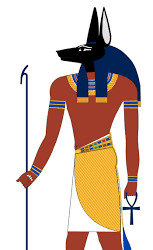
ANUBIS: He’s a good boy, he Guards your tomb after your death. Also keeps balsamists from goofing up on the job.
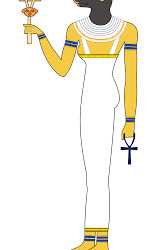
BAST: She’s a happy Kitty who likes to party, she’s the goddess of the home, and, like a real cat, she keeps vermin away.
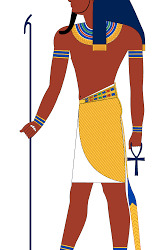
ATUM: The Big Daddy, who created other gods by jacking off. No, seriously.
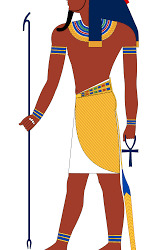
SHU: Son of Atum, God of Air. Pretty boring.
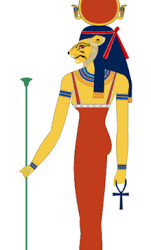
TEFNUT: Shu’s wife, Goddess of Moisture. Yes, MOISTURE. Let that sink in, MOISTURE.
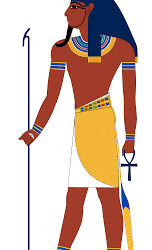
GEB: Son of Shu & Tefnut, God of Earth. He has a goose on his head. The Goose’s name is Steve (not really), and it has rabies (Propably).
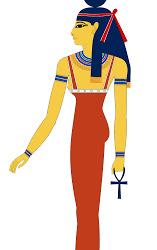
NUT: She’s the Big Lady in the Sky, except she actually IS the sky, With Geb, her husband (And Steve the Rabid Goose), lying under her.
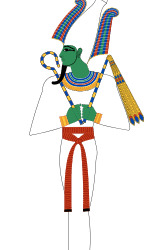
OSIRIS: You know him, you love him, It’s the Lord of the Dead! And Vegetation, that’s why he’s green. He got chopped into pieces by Seth, who scattered his body parts, then he was brought together again by Isis and Nephtys, got embalmed by Anubis, and avenged by Horus.
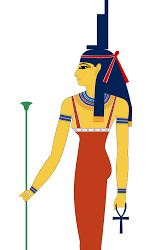
ISIS: AKA the best Mythological MILF, Change my Mind.
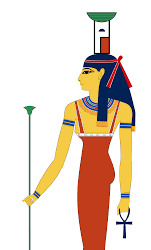
NEPHTYS: Isis’ equally sexy sister, she’s the goddess of... Death, I guess? And Magic, and, amusingly enough, Beer.
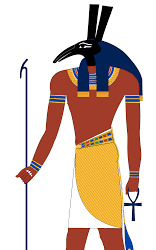
SETH: WTF Is his fursona anyway? A Tapir? A Donkey? An Anteater? The big bad of the Osyrian Myth, and the god of Desert and storms, and Desert Storms.
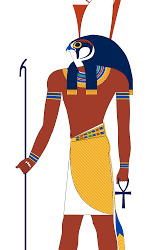
HORUS: Son of Osiris. Captain Falcon over here was a pretty big deal, he was the patron god of Pharaoh, and Egypt in General.
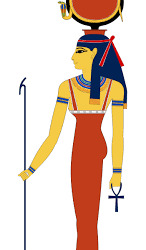
HATHOR: Horus’ wife, Daughter of Ra. Her fursona was that of a cow, but here she only wears horns. She also was a Party girl, and goddess of Love.
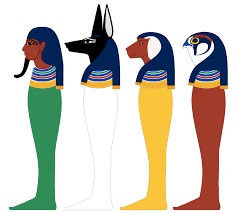
SONS OF HORUS: These rapscallions protected mummy’s extracted innards. And only poor Imsety doesn’t have a fursona.
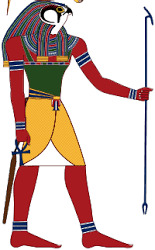
RA: Ra-Ra-Rasputin lover of the... No, wait. Birb Boy here is Ra-Horachty, AKA: Horus LARPing as a Sun God. Ra in general was the Sun, and he had a pimpin boat in which he cruised the sky.
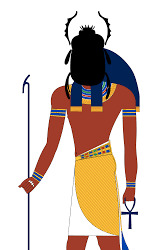
Khepri: God of the Rising Sun, His head is a scarab, because just like a dung beatle rolls a ball made out of shit, so does Khepri rolls the sun. Ewww...
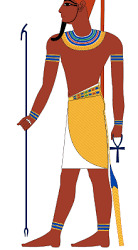
AMUN: The big boss of Thebes. He became the main god during the Middle Kingdom. His name means “Hidden”. Good luck with hiding while wearing such a huge hat tho, idiot!
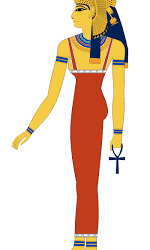
MUT: Amun’s lovely wife, with a dead vulture on her head.
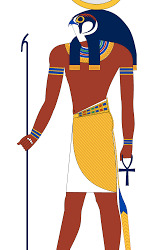
KHONSU: Amun’s son, he’s the God of the Moon. He sometimes had a falcon fursona.

ATEN: This stupid frisbee with hands, is a result of King Akhenaten being a fucking hipster, and trying to create “A nEw mOnOtHeIsTiC rElIgIoN, Hurr Durr”. Good Riddance.
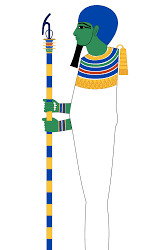
PTAH: Basically Osiris, but without a fancy Atef crown, this guy was the main god of city of Memphis (the one by the Nile, not Mississipi). He also was a patron god of artisans.
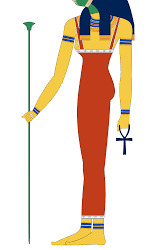
SAKHMET: Unlike Bast, this Kitty here is an Angry pussy (Watch your wording Eggy!). She is a goddess of War, after all, and somehow the Eye of Ra? I dunno, Egyptian Mythology is weird.
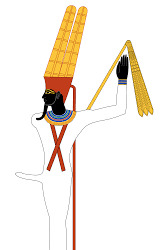
MIN: Basically Osiris, but with Amun’s hat, and a raging boner. Why he has a stiffy you may ask? It’s symbolic, cause he’s a god of Fertility, you pervert!
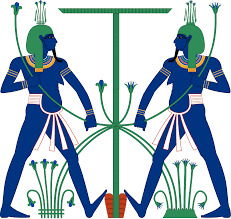
HAPI: The androgynous personification of River Nile. That’s why he/she’s Blue dabadee dabadai.
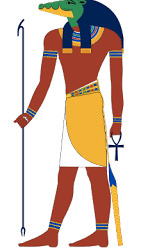
SOBEKH: The God of water, who decided to be original, and instead of being a furry, he became a scalie. XD
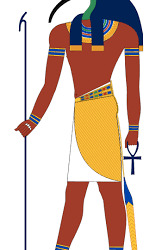
TOTH: Another Birb-boy, this time based on an Ibis, was the god of science (however oxymoronic it sounds), and was the one, who invented Hieroglyphs. Gee Mr. Toth, couldn’t you invent a more coherent system of writing? Because it’s really freaking difficult to read those little pictures, have you heard about an ALPHABET?
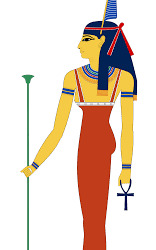
MA’AT: Goddess of truth and law. Her feather was not just a fancy hair accessory, but also acted as a counterwight for the deceased heart, during the judgement of Osiris.
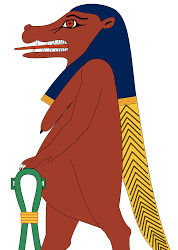
TAWARET: The Hippo Goddess of childbirth. That’s why she THICC yo!
There were many MANY others, but these guys are the most important/interesting/well known. Hoped you liked it.
44 notes
·
View notes
Photo

Gideon Fawkes
Titles: none
Sex: male
Age: 33
Birthday: December 3rd
Height/Weight: 5'8; 131lbs
Card type: Bronze
Race: Osyrian/Angeline
Occupation: Woodsman/poacher
Family:
Father - Vico Rosarte, Angeline priest of Gabriel
Mother - Ishtara Sekir, Osyrian weaver (deceased)
Twin Brother - Álvaro Fawkes, fisherman (deceased)
Adoptive Father - Simon Fawkes, Bismarkian fisherman
Adoptive Mother - Estelle Fawkes, Angeline food seller
Personality:
+ Carefree | Reliable | Amiable
- Secluded | Mistrusting | Dishonest
Despite the tragedies he's suffered, Gideon remains a happy-go-lucky kind of person always willing to lend a hand, though he keeps all acquaintances at arm's length and quickly shuts down attempts to become too friendly. He may have held on to his happiness through it all, but he did not survive without some scars, mainly a vast distrust of people and low expectations for the integrity of men. His respect for ownership is somewhat skewed as well; he believes it doesn't hurt to take what someone won't miss, like deer from a lord's forest or food from a full storehouse. That goes both ways - he's happy to share what he doesn't need with someone less fortunate, though as a landless woodsman, his excess is very little.
Likes:
-- music and song
-- mangoes, a rare treat
-- being alone in the woods
-- whittling
Dislikes:
-- layabouts
-- liars
-- most tea
-- clams
Other:
-- Not especially pious; he doesn't mind those who are and prays when he feels like it, but rarely thinks about religion in his daily life.
-- He considers Simon and Estelle his parents, though he'd like to visit his mother's grave in Strosa someday.
-- “Fawkes” is quick and easy to say and he will respond to it.
-- He’s totally cool with jokes using his surname in place of the f-bomb, since the two can sound similar if said too quickly.
-- What he is not okay with is people addressing him with the f-bomb instead of his actual name.
-- He sings when he's alone, and if he doesn’t know the words he whistles or hums.
-- Though he likes whittling he is not great at it.
-- He and his brother were fraternal twins; they looked quite similar, but were easily distinguished from one another.
History:
Gideon and his twin brother Álvaro were sins.
Their mother, Ishtara, told them of the Angeline priest they were looking for as they made the month-long journey to the HAE by ship, the man whose heritage she’d named their sons for and whose faith she’d tried to emulate with them. How he'd charmed her with his sweet and gentle words and courted her for weeks culminating in a single night of passion before he disappeared back home without a word. Though bitter, they had no choice but to seek him out. Without any family left in Osyria, they desperately needed his help. Ishtara was sick, dying, though she tried to hide it. Gideon knew. Both boys knew.
They practically had to carry her off the wagon when their caravan arrived in Strosa from Bastimona. The weeks had not treated her well; she could not speak, nor walk on her own, so her boys supported her all the way to the church and helped her to sit down on the steps outside. Mistaking them for beggars, someone sent the priest to investigate. Vico stepped out of the doors to his church and laid eyes on the woman he’d left eight years ago as she took her last breaths between her frightened sons. All the scorn and anger she’d wanted to say was lost as she died at his feet.
One look at the boys confirmed his worst fears. These were his sons. And if he could see it so easily, so could anyone else.
Desperate to keep his secret undiscovered, he hid them away at once. Ishtara received a proper burial attended by none in the churchyard, and over the next week Vico made arrangements for Álvaro and Gideon with a couple he knew in Equis. So the seven-year-old twins were shipped off and began a new life as fisherman’s sons. They grew up patching nets and twisting rope with their adoptive father and gathering kindling for the smokehouse with their adoptive mother. They fell into the life easily and took the name of their new family, but never forgot the sharp-eyed priest in Strosa.
Gideon tried to stay busy and helpful even into his teens, never letting hardships worry him, while Álvaro grew unruly and boisterous, often shirking his duties to visit the alehouse with his friends. Though their social paths diverged, the brothers remained as close as ever. As a young man, Gideon knew the waterways and local geography like the back of his hand. He spent days or weeks at a time in the woods along the river’s bank looking for new fishing holes and just enjoying the wilderness. Álvaro, on the other hand, gained the reputation of the town drunk and troublemaker. He got into fights too often to count, occasionally broke a window or made off with a bottle of good wine.
One night, Álvaro was arrested after a man he’d argued with in front of the alehouse was found dead just outside of town. Though he swore up and down he had nothing to do with it, he was arrested and thrown into the town lockup to await sentencing.
Gideon, afraid for his brother’s life and ever loyal to his family, broke him free the night after. The guard caught them in the act and chased them into the north woodland. Álvaro was hit with a crossbow bolt and killed, and though Gideon tried to go back for him, the guards still aimed to kill and drove him further into the woods until they lost his trail.
Afraid, alone, and brokenhearted, Gideon never returned home. He foraged and poached off the land for survival until he found himself far enough from Equis that he no longer had to hide. In time he found a scribe to compose a letter to Father Vico Rosarte to notify him of Álvaro’s death, then put the priest and bones of his family behind him.
Stats:
Base HP: 50 (normal)
Physique: 15
Social Intelligence: 12
Academic Intelligence: 6 [+2]
Practical Intelligence: 19
Actions/Spells: none
Weapons: shortbow and small quiver
-- 1d8, 5 arrows per event
Outfit: Peasant clothes
Traits:
+ Passion of Gabriel: Your loyalty to Gabriel fills you with confidence in yourself, bestowing upon you with +2 Academic Intelligence.
+ Whores and Thieves: First civilization, first criminals, +2 on rolls contributing to criminal activities.
Skills:
Bowman - allows a character to use bows and arrows
Knives - Allows the character to throw knives as a bonus action. 1d4 damage, 5 per Event.
Alchemy Vol. 1 - Character gains “Medicine” skill, whose effectiveness is determined by an INT modifier. Roll d20 to determine how much HP your character can recover on themselves or another between encounters. Cannot cure conditions.
2 notes
·
View notes
Text
Seeing all these gorgeous Sylvari makes me miss Stasi and Osyrian, man. Ugh. Maybe I should start playing again, if only to get new shots. Why, yes, I have a Stasi in every game I play. No, I'm not obsessed, why do you ask?
8 notes
·
View notes
Text
Can a God [especially, Netjer] lie to a devotee?
... I may better believe that random internet person would lie about their "godphone conversation" or other interaction with God, than that a God will lie.
Lying, normally, is not what the Gods will do.
They can, indeed, word things in a tricksters’ way...
Sometimes we may not get the FULL picture, but only what we need to know right now.
[There are gods in other pantheons who don't mind lying and cheating more intense than the Netjeru; but let's talk about the Netjeru]
The Netjeru have no reason to lie to people. Especially to people who are their followers and worshippers, who respect Them and honor Them and are Their friends.
The conversations between Gods themselves, recorded in the myths... well, these are MYTHS.
In the myths, Netjeru used tricks to achieve their goals;
Such as Aset getting to the courtplace on the island, tricking the boatman Anti, then tricking Set to make him proclaim Heru as Heir of the throne.
But this is Mythology, and it took place in Mythical Times, and who knows with which level of metaphor we should perceive all the myths nowadays?
The Myths we have about Netjeru, are human tales about the Gods and not sacrted scripture.
So generally... Can a Netjer lie to a human?
Technically yes, they can. But not exactly telling lies, more likely using trickstery and cheat words if they really need to achieve something GREATLY important.
Even in the mythical times - the Netjeru were not running around lying to people every day.
If we will take the myths of Aset/Isis, we will see that she can tell people not the full truth, and trick them, to achieve something important.
Such as she tricks Anti-boatman to take her to the island where the court is gathering; because it's IMPORTANT for the whole Universe to finish her agenda of Making Heru the King.
And also she tricks Set, using the world-play.
Also when she goes looking for Osiris' body, and enters the King's palace temporarily for babysitting :) she doesn't tell them she is Goddess. But not saying full truth about who you are is not lying.
We can look through the myths and see the behavior of Netjeru.
Babi accuses Djehuty in stealing the offerings; does he tell a lie? By studying this myth carefully, we may come to conclusion that if we take in consideration Khonsu-Djehuty syncretic form, then Babi is not lying, just not knowing/not telling the full truth.
Again, this is not about Netjeru dealing with PEOPLE, this is between the Gods, and so it's harder for us to judge.
What Set was doing in Osyrian myth cycle, again, was important for the whole Universe and cosmic balance, as part of the transformation of Osiris.
What They did, had to be done; and we are living not in mythical times.
Gods don't spend their time all day with us on Earth.
And many of the myths are still myths. We don't have to see them all as something that happened literally.
So, to sum things up, we can find examples of the Netjeru mostly using trickstery, cheat, taking one other' guises in mythology.
But not like they do it all the time. Every thing like this is an exception from "we all live on Maat" rule and is done for greater good.
Aset cheats with Anti and Set, but it's Important to make Heru a King.
So, the chance that the God will LIE to human devotee is really very small, at least with kemetic pantheon.
And even if they will say something that would turn out not to be truth, there are chances of:
godphone jamming,
divination going wrong,
plain misunderstanding,
Gods tricking you into doing something for the purpose of some greater good that you will realize later.
Also Gods may just play harmless pranks. For fun. They do.
Their agendas are so big that we simply can't comprehend the WHOLE picture.
About God theoretically telling to a huge wrongdoer "What you are doing is ok"...
-- there is a big chance of:
dealing with impostor entity/spirit,
person making things up,
person dealing with their own thoughtform,
person misinterpreting the message of the God, etc.
Because we would like to hear good things. And receive approval from Gods.
Also the godphoning itself is a thing that is complicated.
Impostors happen. Wishful thinking happens.
Just plain dealing with imaginary friend instead of God may happen.
And so my opinion is, the Netjeru must have Very Serious Reason to tell a human something that would qualify as a lie.
And even then, human interpreting is as a LIE may be wrong.
Trickstery is not always lying.
Just like the kids scream "abuse" when God doesn't give them candy,
then they may scream "Lie!" when a God simply made a prank.
Also, theoretically, God may lie to a devotee with really serious reason: for example, to save them from something really bad happening, from the chance of devotee being seriously hurt, etc.
And so, summarizing the things up (This is my opinion, remember):
- there is a possibility the God may lie to a person.
- but the chances that a Netjer would intentionally lie to a devotee, are really small.
Our relationships with the Netjeru should have foundation of respect, faith, trust, devotion, love;
Gods are not predators looking for our energy and our offerings.
They are our Friends, Parents, Brothers, Teachers, Mentors, Guides.
And before all, They Are Gods;
Gods, worthy-of-worship.
* all points expressed above are my private opinion
13 notes
·
View notes
Text
got tagged by @cutiekyo
Name: Alex (internet name)
Nickname: Al
Zodiac sign: Cancer
Hight: 1,55 m
Orientation: Demisexual
Ethnicity: Italian
Favourite fruit: Strawberries
Favourite season: Winter
Favourite book series: Harry Potter, Percy Jackson, Inkheart ( I can’t choose)
Favourite flower: Osyrian Rose
Favourite hot beverage: Hot Chocolate
Favourite animal: Cats
Average sleep: 6 hours
Favourite charcters: Finnick Odair, Fred & Geroge Weasley, Mortimer Folchard, Aladdin, Loki, Charlie Bradbury, Rory Williams.
Number of blankets you sleep with: 2
Dream trip: England
Blog created: 2015
Number of followers: 70
I’m tagging @thannuky17 @scorpio-no-kardia @theone-girl @gingergirl2. Have fun!!!
0 notes
Text
#I’m ctfuuu#osyrian#black is better#black is beautiful#black queen#black king#starchildren#melanatedandproud#melanatedking#melanin#black magic#gold#blacker than god
3 notes
·
View notes
Text
#osyrian#black is better#black is beautiful#beauty#black power#black woman#black is king#black man#true statement#black men#art#hidden colors
5 notes
·
View notes
Text
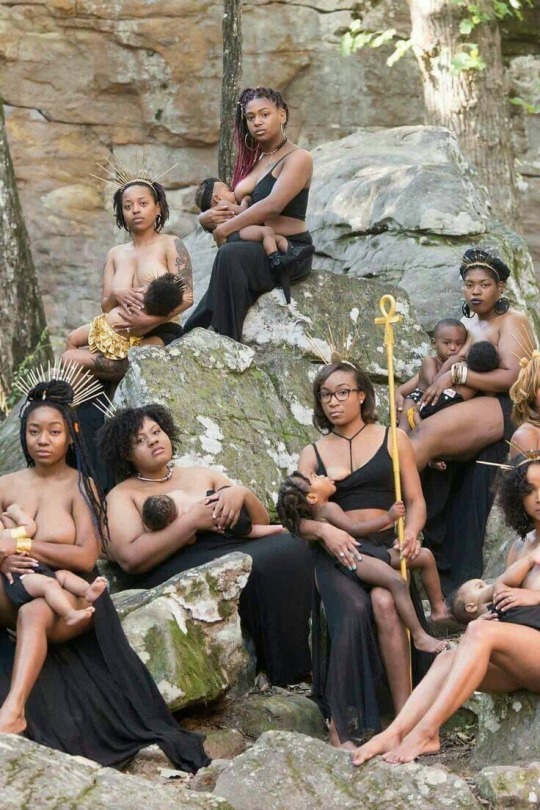
When your God was turning Water into Wine,
My God was turning Blood into Milk.
#osyrian#black is better#black is beautiful#beauty#black is king#black power#black woman#black man#beautiful photos#black women are everything#beautiful black women#i feel empowered#black is the color of my true love’s skin#black babies#black children#beautiful black people#black people#black girl aesthetic#black girl joy#black girl magic#blackgirlmagic#black magic
184 notes
·
View notes
Text
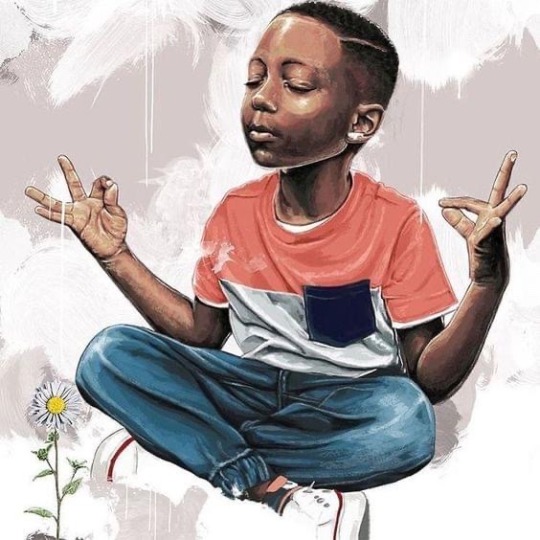
Black boy zen.
#black is better#black is beautiful#black is king#black power#black man#black knowlege#black art#black boys#black brothers#young black and gifted#black people#osyrian
235 notes
·
View notes
Text

#osyrian#black is better#black is beautiful#beauty#black woman#black is king#black power#black man#black magic#black hair#beautiful black people#black beauty#sun#sun people#children of the light#children of the stars#children of the sun
145 notes
·
View notes
Text
‼️‼️ HAPPY JUNETEENTH TO THE MOST BEAUTIFUL RACE ON THE PLANET ‼️‼️
✊🏼💛✊🏾🤎✊🏿🖤
#osyrian#Juneteenth#happy Juneteenth#black people#black America#black is better#black is beautiful#beauty#black is king#black power#black woman#black man#black men#black women#black#black hair#black magic#black beauty#bla#pan african#diaspora#african culture#african diaspora
36 notes
·
View notes
Photo

Do you see repeating numbers? These are their meanings.
#osyrian#numbers#motivational#motivation#positive words#positive#life#meaning#inspiration#signs#numerology
1 note
·
View note
